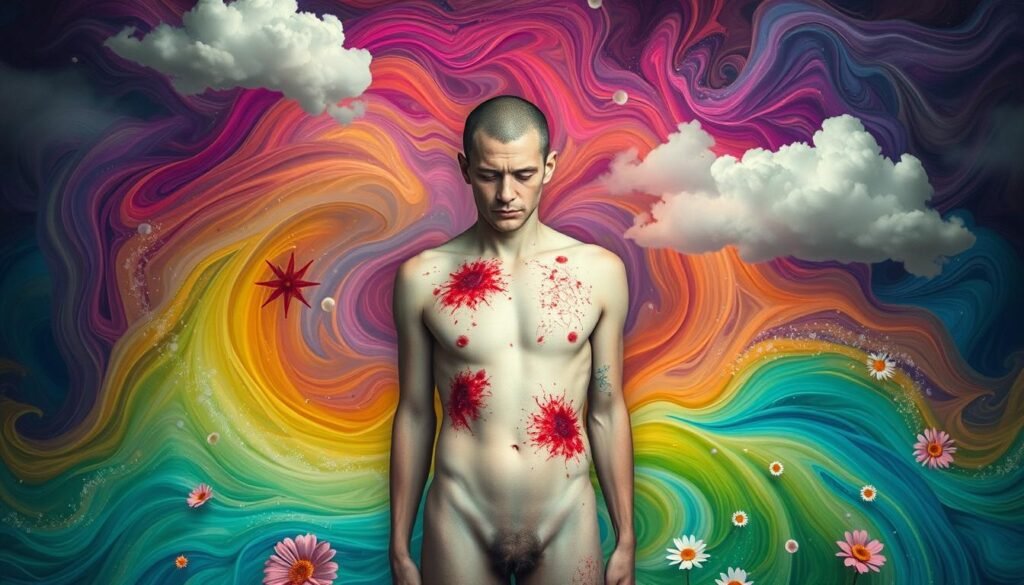Over 40 million adults in the United States are affected by anxiety disorders every year. This isn’t just about feeling worried. Anxiety can also lead to physical symptoms, such as itching. Many people might not realize that itchiness can come from their anxiety.
Chronic itch bothers more than 1 in 5 people at some point. This itching can often be linked to how someone feels emotionally. It’s important to see how anxiety can cause skin issues like psychogenic itch. Professional studies, such as those found on Medical News Today, show various reasons for itchy skin. These studies highlight the connection between our minds and bodies.
Key Takeaways
- Anxiety disorders impact 40 million adults in the U.S. annually.
- More than 20% of individuals experience chronic itch at some point.
- Stress hormones can lead to skin irritation and itchiness.
- Identifying underlying issues is key for effective treatment.
- Stress and anxiety can worsen chronic skin conditions.
- Managing anxiety may help alleviate physical symptoms like itching.
Introduction to Anxiety and Its Physical Symptoms
Anxiety disorders are a major concern for mental health. They affect millions around the world. Not only do they harm emotional well-being, but they also show up as physical symptoms. People with anxiety might shake, feel their muscles tense up, and have a fast heartbeat. These symptoms can make daily life really hard.
Some symptoms that don’t get a lot of attention are how anxiety affects the skin. This can cause itching, hives, and rashes. Anxiety can also make skin problems like acne, eczema, and psoriasis worse. When the skin itches or hurts, it can make anxiety levels shoot up. This starts a tough battle between mental and physical health.
A lot of people deal with itching. Studies show that one-third of people feel it every week. But only 10% get help for their constant itching. The link between anxiety and skin problems is complicated. It can really lower the quality of life. People with ongoing itch report it affects their mental health and how they get through the day.
- Psychogenic itch is seen as a disorder. It’s when the mind heavily affects the feeling of itching.
- The worse the itch, the worse the health effects. This includes more anxiety.
- Experts stress treating both symptoms to get better mentally and physically.
It’s important to understand how anxiety and physical symptoms are linked. Seeing the connection helps with finding good treatments. Managing anxiety can make physical symptoms better. This improves life overall.
The Link Between Anxiety and Itching
The link between anxiety and skin health is strong, especially with something called psychosomatic itching. This isn’t due to skin problems but comes from emotional unrest. When itching is chronic, it can make anxiety worse.
Studies show that those with chronic itch often feel more anxious, sad, and even have thoughts of suicide. This harms their life quality. People with skin issues like pruritus also tend to be more anxious. Those with intense psoriasis itching report higher anxiety levels than those with mild symptoms.
Treating skin issues can also help with anxiety. For example, using dupilumab for skin problems like atopic dermatitis can lower itchiness and anxiety. Severe itching in plaque psoriasis patients often leads to more anxiety and sadness.
Stress can make itching worse in conditions like atopic dermatitis and psoriasis. This starts a tough cycle of itch and anxiety. Events causing stress can also make itching more intense. Understanding this link is vital for treating both skin and anxiety issues. For more about anxiety symptoms like numbness, check out this source.
Understanding Anxiety Symptoms
Anxiety affects our emotions in many ways. It can make it hard for people to manage their feelings. This often leads to stress and worry that disrupt daily activities.
Anxiety brings both mental and physical symptoms. You might feel very worried, irritable, or unable to rest. Sometimes, you may have headaches, feel sick, or notice skin problems. Anxiety can make the body react strongly, causing skin issues like rashes. These usually go away fast, but the emotional effects can last longer.
Generalized anxiety disorder (GAD) shows through several symptoms:
- Difficulty sleeping
- Restlessness
- Fatigue
- Physical symptoms like palpitations or dizziness
- Low mood or feelings of hopelessness
Treatments like cognitive behavioral therapy (CBT) and medicine help manage anxiety. They address the emotional troubles that affect one’s life. For skin issues caused by anxiety, creams and antihistamines can offer relief. Knowing how our feelings and physical symptoms are connected helps us seek the right treatment.
Dealing with anxiety means knowing what triggers it and how to handle those triggers. Changes in lifestyle can improve how we feel. It’s also important to see doctors for serious distress or persistent skin problems. To learn more about how anxiety affects the skin, visit anxiety symptoms and skin conditions.
Can Anxiety Cause Itching? Exploring the Evidence
It’s important to know how anxiety can physically affect us. Studies link emotional distress to skin symptoms. We’re going to look at how anxiety disorders may cause skin problems like itching.
The psychological effects on skin
Psychological effects on skin are significant for those with anxiety. Anxiety can make skin itch more due to stress. Scans show stress affects the amygdala, which increases itch perception. So, anxiety can make us oversensitive to normal sensations.
Studies on the correlation of anxiety and pruritus
Many studies on anxiety show a clear link between anxiety and itching. People with atopic dermatitis feel more itch when stressed. Stress in rodents increases scratching and messes with itch processing. This shows the question, can anxiety cause itching, is based on real findings. It highlights the complexity of treating both anxiety and skin symptoms together.

| Study Focus | Findings |
|---|---|
| Rodent Studies | Chronic stress enhances itch responses and scratching behavior. |
| Atopic Dermatitis | Significant correlation reported between anxiety levels and perceived itch. |
| Human Imaging Studies | Hyperactivation of the amygdala associated with high anxiety levels. |
| General Psychological Effects | Chronic stress can exacerbate itchiness and modify sensory processing. |
The Vicious Cycle of Anxiety and Itching
Anxiety and itching are closely linked, forming a tough cycle for many. Anxiety can make itching worse, leading to more stress. This makes the cycle hard to break, as each symptom feeds into the other.
How anxiety intensifies itching sensations
High anxiety levels can make the nervous system more sensitive, including to itching. This sensitivity increases itch perception and leads to scratching. Scratching harms the skin, causing more irritation and anxiety. Thus, a hard-to-break loop is formed.
Feedback loop of symptoms in individuals
This cycle of anxiety and itching deeply affects a person’s life. It makes stress and itching worse, impacting daily activities. Effective treatment often requires addressing both anxiety and itching together, as research shows their close link.
Stress and Its Role in Exacerbating Itching
Stress affects our health in many ways, especially our skin. It often leads to more itching. By understanding the link between stress, hormones, and emotions, we can better tackle this problem.
Hormonally driven responses to stress
Stress triggers hormones like cortisol and adrenaline. These hormones can cause skin issues to get worse. Conditions like eczema, psoriasis, and rosacea can flare up due to these hormonal changes. If stress is constant, it can make us more sensitive to itching. This can cause a cycle of stress and discomfort that is hard to break.
Impact of emotional stress on the skin
Emotional stress can also harm our skin, making conditions worse. Studies show that those with mental health problems might itch more. This isn’t just annoying. It can lead to serious skin problems and infections. Stress makes the nerves more sensitive, which makes the itch feel worse. This creates a cycle of stress and itching that needs attention.
| Condition | Relation to Stress |
|---|---|
| Eczema | Stress can trigger flare-ups and intensify itching sensation. |
| Psoriasis | Emotional stress often correlates with increased severity of skin symptoms. |
| Rosacea | Flare-ups can occur due to hormonal responses from stress. |
| Hives | Can be exacerbated during high-stress situations. |
| Chronic Itch | Can lead to mental health issues if untreated, such as anxiety. |
Common Skin Conditions Worsened by Anxiety
Anxiety often mixes with skin problems, making a complex issue. Conditions like eczema and psoriasis get worse with anxiety. It’s key to know this link to manage health better.
Conditions like eczema and psoriasis
Eczema and psoriasis cause a lot of discomfort. Studies show that people with these conditions often feel more anxious. For eczema, the chance of anxiety is 1.1358 times higher. For psoriasis, it’s 1.3685 times more likely. This data shows how these conditions can make anxiety worse, affecting sufferers both physically and mentally.
The role of chronic skin conditions in mental health
Long-term skin problems and anxiety can create a vicious circle. A study found that about 23.4% of those with skin diseases also suffer from anxiety. This issue is common and affects many people’s lives deeply. Dealing with visible skin problems and emotional stress can be tough. Many fall into a cycle where stress from their skin condition heightens their anxiety, making their skin issues even worse.
The Mind-Body Connection: Psychodermatology
Psychodermatology explores the vital mind-body connection regarding our skin and mental health. It shows how emotional stress can seriously affect our skin. Issues like acne and eczema often stem from psychological factors. This field combines skin care with mental health treatment, showing the link between anxiety and skin issues.
There are three main types of psychodermatologic disorders. Chronic acne and rosacea, for example, are closely linked with psychological stress. Studies have found people with rosacea are more likely to experience anxiety or depression. This highlights how deep the connection between our mind and skin can be.

Stress can trigger a harmful cycle that makes skin conditions worse. This is seen in the “itch-scratch cycle.” For instance, those thinking they’re infested with bugs face a tough challenge. They often bring proof of their distress, which complicates treatment. Sensitive solutions, like specific medications, are critical for relief.
Between 30 to 60% of skin conditions involve psychological aspects. Effective treatments often include mental health therapies, like cognitive-behavioral therapy. These treatments are especially helpful for those dealing with anxiety or depression due to skin issues. Understanding the mind-body connection lets us approach health more holistically, benefiting both our skin and overall mood.
Managing Anxiety to Alleviate Itching
Understanding the link between anxiety management and chronic itch relief is key for those affected. Anxiety therapies not just boost mental health but also help relieve physical symptoms like itching. These methods include psychological help, medication, and changing lifestyles to reduce both skin irritation and anxiety.
Therapies and interventions for reducing anxiety
Many therapies exist to control anxiety symptoms effectively. For example, behavioral therapy, such as cognitive-behavioral therapy (CBT), changes negative thoughts and builds better coping skills. Medicines like oral selective serotonin reuptake inhibitors regulate mood. Meanwhile, practices like meditation and yoga help one relax, aiding in mental and physical health.
Methods for addressing chronic itch issues
A combination of strategies works best for chronic itch. Exercise releases endorphins, making you feel good. Techniques like deep breathing and mindfulness reduce anxiety and itchiness. Plus, skincare routines with specific creams or moisturizers address the inflammation and dryness causing itch.
| Therapy Type | Description | Benefits |
|---|---|---|
| Behavioral Therapy | Cognitive strategies to manage anxiety | Reduces anxious thoughts and improves coping |
| Medication | SSRIs and other prescriptions | Helps in mood stabilization |
| Stress Management Techniques | Mindfulness, meditation, and yoga | Promotes relaxation and mental clarity |
| Physical Activity | Regular exercise routines | Boosts endorphins and overall mental health |
| Skincare Regimen | Use of medicated creams and moisturizers | Provides chronic itch relief and soothes skin |
Using a well-rounded approach that tackles both anxiety and skin ailments is crucial. Consulting with healthcare experts is important. They help find the best anxiety therapies and chronic itch treatments. This leads to a happier mind and healthier skin.
Preventative Strategies for Anxiety-Related Itching
Anxiety-related itching can be very upsetting. But, you can greatly lessen symptoms with the right strategies. Combining mental wellness and skin care helps a lot. By using smart stress reduction techniques and skin care plans, people can feel much better and reduce itchiness.
Stress reduction techniques and practices
Beating anxiety-itching starts with good stress reduction techniques. Here are some methods to use:
- Mindfulness meditation: Mindfulness brings peace and lowers anxiety.
- Regular exercise: Exercise makes your body release happy chemicals that fight stress.
- Proper hydration: Drinking water keeps your skin healthy and less itchy.
- Deep breathing exercises: Breathing deeply calms you down and lessens anxiety.
Using smart stress management can reduce how much anxiety affects your skin.
Skin care routines to enhance skin barrier resilience
A great skin care routine is vital for controlling anxiety-itching. Here are some tips:
- Moisturizers: Pick moisturizers with ceramides to keep your skin moist and strong.
- Cool baths: Short, lukewarm baths soothe the skin. Cool cloths also help a lot.
- Avoiding irritants: Don’t use strong soaps or products that can make itching worse.
- Identifying triggers: Writing down what triggers your itch helps avoid those things in the future.

Good skin care routines greatly boost skin health and comfort. Tackling both your mental and skin health is the best way to fight anxiety-related itching.
Conclusion
Understanding the link between anxiety and itching is vital for those affected. Emotional stress, especially anxiety, can make itching worse. This creates a distressing cycle that hurts both mental and physical health. Recognizing these signs is key to getting the right help.
Experts advise a comprehensive treatment plan for both anxiety and itchiness. Therapy, specific medications, and lifestyle changes can really help improve life for sufferers. It’s also important to see a specialist if the itching is bad or comes with other health issues.
Integrated care helps individuals manage their symptoms and boost their overall well-being. For more details, look at research on how itching affects mental health. This shows how important quick help is for both mental and physical health. For helpful information, check out this study.